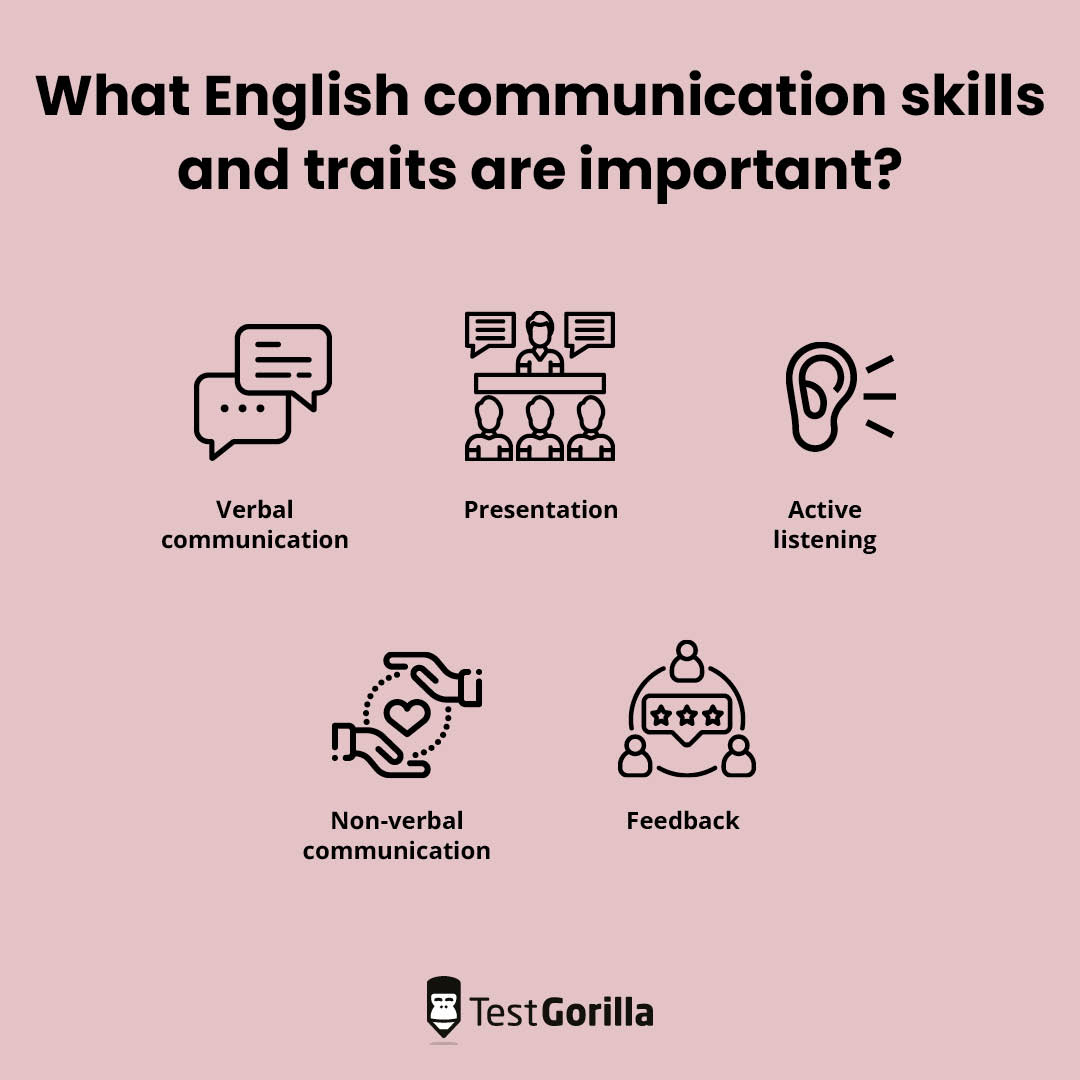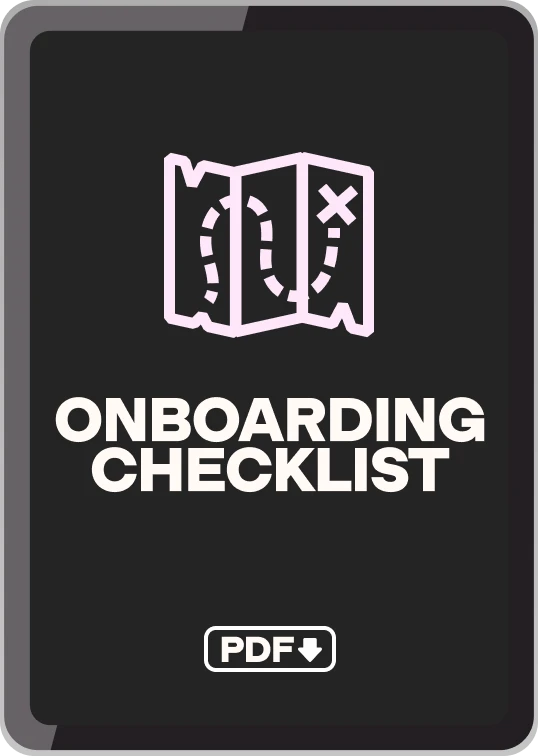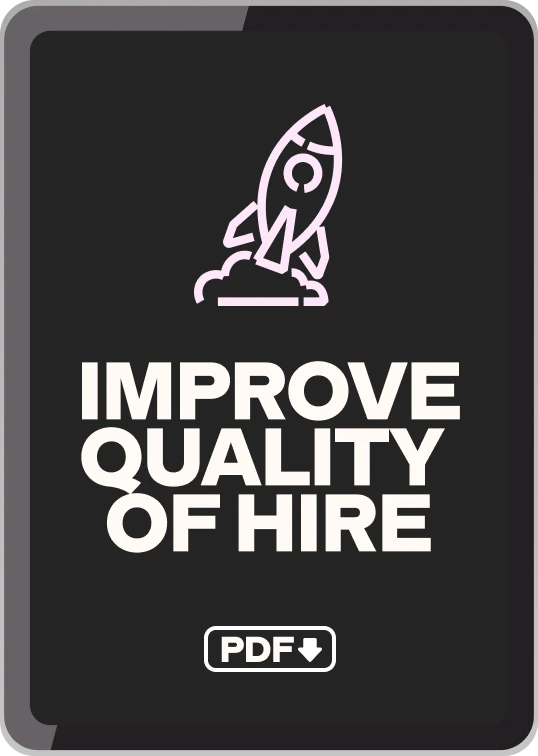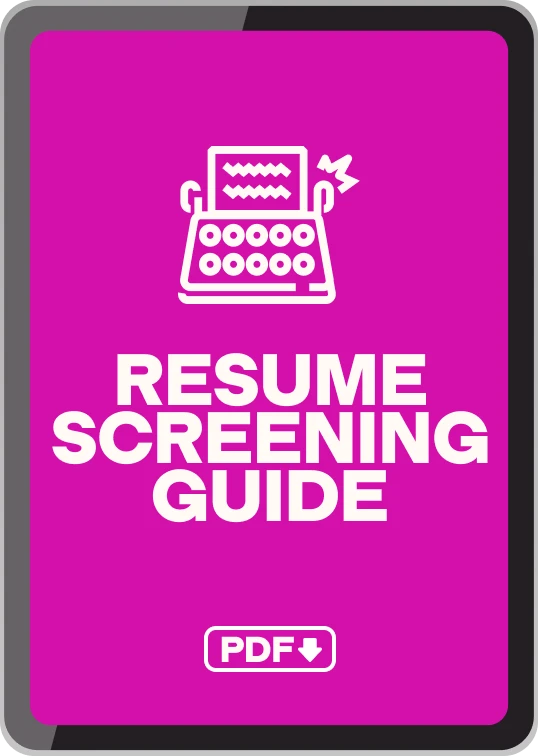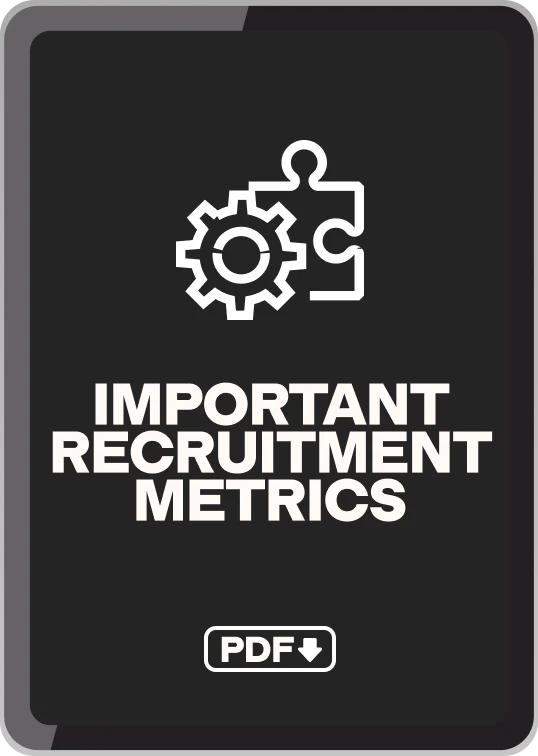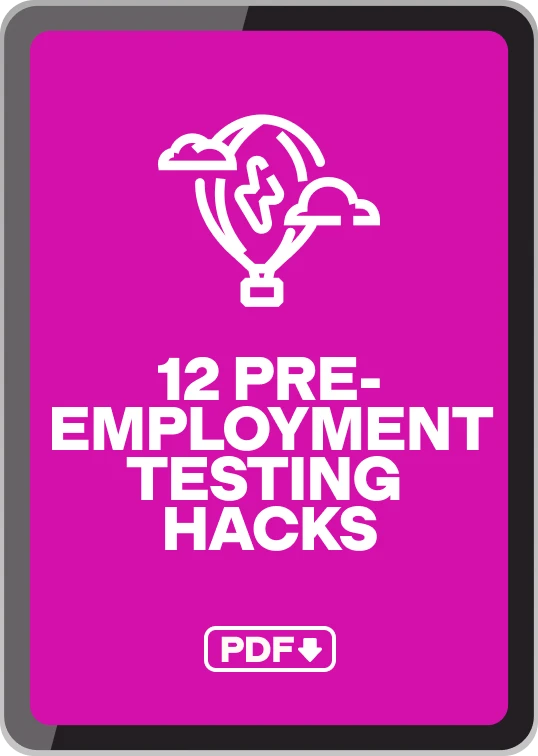How to assess English communication skills
Good communication skills are one of the top skills that employers look for.
Every day, employees spend a considerable amount of time exchanging emails and messages with colleagues and clients. The ability to communicate clearly and effectively means less chance of misunderstandings and mistakes.
English communication skills (verbal and non-verbal) directly impact an employee’s success and performance at the workplace, yet most employers rely on their subjective judgment when assessing these skills. This leads to inconsistency in the assessment process and difficulty finding talent with the right communication skills for each role.
By using intelligent assessment tools, you can measure a candidate’s advanced business communication skills accurately. Let’s look at how to assess English communication skills and the best tests to use. You’ll quickly learn how to spot the best candidates and improve workplace communication.
Table of contents
What is an English communication skills assessment?
English communication skills assessments help an organization evaluate a candidate’s proficiency in reading, writing, listening comprehension, and understanding of verbal and non-verbal communication.
Simply put, these assessments measure applicants’ ability to effectively express their ideas and respond to various scenarios in English.
As an employer, you can’t afford to hire someone who doesn’t have the necessary English language skills,, as it could lead to costly errors or lost clients.
When assessing English communication abilities, you should use the tools appropriate to every role. For instance, if the roles in your organization are customer-focused, choose a test that measures a candidate’s ability to converse with customers, or combine an English language proficiency test with a customer service skills test.
On the other hand, if a position requires excellent workplace communication skills or a combination of workplace and customer-focused communication skills, choose a combination of tests that can evaluate both.
Why are English communication skills important?
English is one of the most widely-spoken languages in the world. To survive and thrive in a digital future, you must have a good command of the language.
Let’s take a closer look at why excellent English communication skills are essential.
1. Helps in delivering presentations and speeches
The English language has over 300 million native speakers and over one billion non-native speakers.
English is widely used in everyday business communication, so having employees with excellent English skills makes it easy for your organization to connect with its customer base. It also means increased opportunities for business growth.
2. Develops effective interpersonal skills
Interpersonal skills are essential for employees to collaborate effectively with other team members. In fact, there are four types of communication.Good communication skills help develop and maintain relationships among coworkers which is crucial to successful teamwork.
Strong interpersonal skills also allow employees to express their ideas more efficiently in the work environment, ensuring smooth working relationships.
3. Is the language of the internet
Over half of all active websites are in English. With everything being digital nowadays, businesses need to have an online presence. One of the easiest ways to increase your brand’s visibility is by putting out messages about your business – and which better language to use for brand messaging than English?
When you have employees with good English skills, you won’t have the worry that they will misrepresent your brand on digital platforms. You can easily include employees with excellent English proficiency in your digital marketing and PR efforts, as they can communicate your message accurately to a global audience.
4. Opportunities for growth
Growth makes employees excited. Employees are motivated to perform their roles better when they know there’s an opportunity for growth, such as through promotions. Higher organizational positions require better communication of ideas and opinions, which is why good English skills are essential.
Being proficient in English ensures that employees can handle the additional responsibilities associated with senior roles in an organization.
Likewise, it might be time to expand to new markets if your business performs well. You can only tap into the full potential of these markets if the people concerned with your organization’s public image can communicate effectively with new target audiences in their native language.
What English communication skills and traits are important?
If it’s your first time assessing English communication skills, you might not know what to look for. Here are some essential skills and traits you should pay close attention to.
Verbal communication
Verbal communication is using words to share ideas, opinions, and feelings. It encompasses both oral and written communication.
Oral communication: Employees with proper oral communication can speak clearly, concisely, and without misinterpretation. Verbal communication skills are important even when a role involves little talking. For instance, if you’re a data entry clerk at an organization, you still have to speak clearly to your colleagues or manager to explain your work progress.
Written communication: This is as important as oral communication. Employees must exchange emails with colleagues, write emails to customers, and draft reports almost daily. They must be proficient in grammar, punctuation, and other writing fundamentals.
Reading comprehension: Reading comprehension is also an important skill you should look out for. Employees need to read emails, customer queries, reports, and other documents and understand them to do their job effectively.
Presentation
Presentation skills are another critical communication skill most employers and hiring managers must remember to assess.
Good presentation skills don’t only mean that a candidate is good at making Microsoft Powerpoint presentations. They also mean that the candidate can:
Explain how they perform their duties
Present their findings if in a research role
Explain the benefits of your products or services to a client
Active listening
Listening is as essential as speaking. Active listening means the employee is attentive and actively engaging with what is said during a conversation or a presentation.
Employees who are good at active listening can:
Retain information from conversations better
Understand others’ viewpoints better
Think more critically about an issue before making decisions
Engage in meaningful conversations with colleagues
Ask clarifying questions so a customer or colleague feels heard
Active listening is essential in all job roles, from managerial to entry-level. Employees need this skill to communicate effectively and succeed in the workplace.
Non-verbal communication
Non-verbal communication helps grow trust among coworkers and clients.Your non-verbal cues, such as gestures, posture, body language, paralanguage, and facial expressions don’t lie. This makes it easy for people to trust them more than words.
How are non-verbal cues part of necessary English communication skills? Communication is specific to a culture, and one non-verbal cue might mean two different things. For instance, it’s common to bow in greeting in Japan, but it’s not the way saying hello is done in the US or UK.
Employees can communicate more effectively in all settings by understanding their own non-verbal communication and those of others.
Feedback
Providing and accepting feedback requires good English skills. It is an integral part of teamwork, allowing for a better understanding of roles, expectations, and mutual respect.
In fact, Zippia reports that 65% of employees desire more feedback.
Giving and receiving feedback is tied to career success. It shows a willingness to learn, openness to constructive criticism, ability to adapt, and critical thinking. Candidates must communicate feedback respectfully and effectively so everyone can get value from the conversation.
A candidate’s English communication skills are incomplete without the ability to provide and accept feedback. When receiving input from a supervisor, an employee needs to listen, understand, and accept the feedback..
5 English communication skills and traits tests
Organizations that conduct pre-employment screening are more likely to hire high-quality talent. To perform adequate pre-screening, you must know which tests to use.
Let’s look at some of the best English communication skills tests. These tests help you objectively assess a candidate’s English communication skills.
1. English (Elementary/A2) test
This test is best for assessing a candidate’s basic English skills.
Use the English (Elementary/A2) test for roles that require understanding basic grammar and vocabulary.
This test is a language proficiency test that evaluates whether a candidate has beginner-level proficiency in English.
Which English skills does this test assess?
This test evaluates the candidate’s abilities in the following areas:
Vocabulary: Assesses the ability to understand and use familiar everyday expressions and common phrases.
Grammar: This test checks knowledge of grammar and the ability to construct simple sentences. It helps assess a candidate’s ability to understand simple conversations and texts.
Simple sentence composition: Assesses if a candidate can form simple sentences and use basic language structures.
Reading comprehension: Evaluates a candidate’s ability to read and understand basic English.
Benefits of this test
This test helps you tap into a talent pool that can:
Express needs, wants, and interests
Do well in social situations that require basic conversation
Understand simple instructions
Read simple texts
Correctly use basic grammar
Why use this test?
This test was created by subject matter experts to align with the Common European Framework of Reference for Languages (CEFR) proficiency guidelines. It’s ideal for anyone hiring for a position where basic English is required for everyday conversation.
It can boost workplace cohesion and collaboration by allowing you to assess which candidates can effectively interact with their colleagues and navigate English-speaking environments.
2. English (Intermediate/B1) test
This test is best for assessing a candidate’s intermediate-level English skills.
Our English (Intermediate/B1) test measures a candidate’s ability to communicate in everyday contexts and use technical language related to their industry.
The English (Intermediate/B1) test uses texts and sentences that mimic real-life work situations.
Administering this test before hiring candidates can help remove language barriers and enhance the flow of information in your organization. This, in turn, improves collaboration among employees, allowing them to perform at their best.
Which English skills does this test assess?
This intermediate-level test checks if an employee can:
Understand more in-depth information
Understand familiar phrases allowing them to be more involved in conversations
This test covers a variety of English communication skills, including:
Basic grammar and vocabulary: Assesses a candidate’s proficiency in grammar and their ability to use less known words and phrases accurately.
Reading comprehension: Evaluates a candidate’s ability to understand what they are reading, whether it be an article or an instruction manual.
Listening comprehension: Tests a person’s spoken language comprehension in general and technical contexts.
Sentence composition: Checks if the candidate can clearly express their thoughts through writing.
Benefits of this test
The English (Intermediate/B1) test is ideal for roles involving everyday communication with clients, stakeholders, and coworkers. These include customer support and sales representatives. It helps you hire individuals who can:
Write simple texts in standard language and can interpret other simple texts
Use an above-average level of English in everyday situations
Use spoken language to describe a situation and give instructions
Understand the main points of more complicated texts and can explain them in their own words
Why use this test?
This English (Intermediate/B1) test is a reliable and cost-effective way to objectively measure your candidate’s language skills. The test results are instant and provide detailed information on the applicant’s fluency and any areas of weakness.
All our language tests are created to align with CEFR language proficiency standards, so you can be sure that your candidate’s skill is being evaluated accurately and thoroughly.
3. English (Upper Intermediate/B2) test
This test is best for assessing a candidate’s upper intermediate-level English skills.
The English (Upper Intermediate/B2) test evaluates the ability to understand and interpret the main ideas in complex text on concrete and abstract topics. These include technical and business subjects.
Which English skills does this test assess?
This test evaluates the following English communication skills:
Grammar & Vocabulary: Does the candidate correctly use intermediate-level grammar and vocabulary?
Reading Comprehension: Does the candidate understand intermediate-level texts?
Sentence Composition: Can the candidate efficiently structure sentences?
Listening Comprehension: Does the candidate understand intermediate-level conversations?
Benefits of this test
This test helps you tap into a talent pool that can:
Express complex viewpoints
Communicate with other English speakers fluently and spontaneously
Produce clear and detailed texts on complex topics
Why use this test?
This test is ideal for any role that requires fluency in English. It is also useful when measuring a candidate’s ability to process complex texts and critically evaluate information.
You can use this test to assess the language proficiency of those who plan on living and working in countries where English is the predominant language.
Your organization will benefit from having employees who can effectively implement your business goals and express themselves in various cultural and social situations.
4. English (Proficiency/C1) test
This test is best for assessing a candidate’s proficiency using English.
When hiring for a role that requires advanced English communication skills, use the English (Proficiency/C1) test. This test evaluates a candidate’s ability to express themselves fluently and spontaneously. It helps you hire someone who can quickly find the right words or expressions to use in every context.
Which English communication skills does this test assess?
This test evaluates a candidate’s proficiency in the following:
Forming complete sentences: If putting thoughts and ideas into complete sentences through writing or presentation matters the most in a role, this test is ideal.
Listening comprehension: Evaluates a candidate’s ability to understand speech about abstract, complex, or unfamiliar ideas.
Reading comprehension: Assesses the ability to understand long, complex texts about various topics, both familiar and unfamiliar. Such texts can be anything from summaries to autobiographies.
Grammar and vocabulary: Checks if a person can accurately use the correct grammar and vocabulary in familiar and unfamiliar contexts.
This test is ideal when hiring people who need proficient English skills to excel in their roles. These include editors, writers, customer success managers, and content creators.
Benefits of this test
The English (Proficiency/C1) test helps you hire individuals who can:
Communicate effectively in managerial and other professional roles
Participate confidently in workplace meetings and presentations
React effectively to various cultural and social situations
Express themselves with a high level of fluency
Why use this test?
With this test you can tap into a talent pool that uses language flexibly in various social and professional situations. It helps you objectively gauge a candidate’s ability to understand longer text in verbal and written communication.
5. English (Proficient/C2) test
This test is best for assessing a candidate’s English mastery.
The English (Proficient/C2) test assesses if a candidate has attained an exceptional level of English and measures their ability to communicate fluently like a highly competent English speaker.
The English (Proficient/C2) test evaluates candidates according to the CEFR standards. This advanced English test measures a candidate’s understanding of native-level English.
Giving potential employees this test enables you to hire people who can communicate fluently and collaborate with customers and coworkers in every business environment.
Which English skills does this test assess?
This test measures various English communication skills to help you hire the right candidate. It helps ensure that a candidate:
Quickly understands read and spoken information
Has no barriers to communicating and comprehending information
Can understand spontaneous complex language encounters
Some of the critical areas that the English (proficient/C2) test assesses include:
Grammar: Evaluates a candidate’s ability to use and understand complex grammar structures accurately and effectively.
Vocabulary: Checks if candidates have an extensive vocabulary and whether they can use the correct words to express their ideas.
Reading comprehension: Assesses a candidate’s ability to understand and interpret complex written texts. It checks for understanding of words and the contexts of the words.
Listening comprehension: Measures a candidate’s ability to understand spoken English. This includes nuances, oral expression mannerisms, and non-technical cultural terminology (slang).
Benefits of this test
This screening test helps you identify a candidate’s ability to succeed in various roles, including sales, customer service, management, and leadership positions. Aside from showing that a candidate has mastered English to an exceptional level, administering this test helps your organization in these ways:
Improves customer satisfaction and loyalty: It ensures a candidate can communicate fluently with customers.
Eliminates bias: Helps you hire without bias by allowing data-driven and performance-based ranking.
Collaboration: It promotes the culture of collaborating with teammates from all backgrounds, which increases productivity.
Solid relationships: Enables your organization to build strong relationships with stakeholders and grab new international market opportunities.
Why use this test?
A subject matter expert with a Ph.D. in English and Applied Linguistics developed the English (Proficient/C2) test. This expert has over 25 years of experience teaching English as a second language.
The test is also CEFR-aligned, so you can be sure that the results are highly accurate.
By giving this advanced English communication skills test to potential employees, you can ensure they possess the proficiency level your organization needs. You save time in the recruitment process by weeding out candidates who don’t have the necessary language proficiency.
Let us help you find the best English communicators
Pre-employment screening allows you to determine if a candidate’s characteristics, personality traits, and cognitive abilities are the right fit for a role.
If you’re looking for the best language assessment tools, try our TestGorilla screening tests to assess candidates objectively while offering them a positive experience with our user-friendly interface.
Get started with your free account today, and let us help you find the best communicators for your organization.
Related posts
You've scrolled this far
Why not try TestGorilla for free, and see what happens when you put skills first.
Latest posts
The best advice on pre-employment testing, in your inbox.
No spam. Unsubscribe at any time.

Hire the best. No bias. No stress.
Our screening tests identify the best candidates and make your hiring decisions faster, easier, and bias-free.
Free resources
This checklist covers key features you should look for when choosing a skills testing platform
This resource will help you develop an onboarding checklist for new hires.
How to assess your candidates' attention to detail.
Learn how to get human resources certified through HRCI or SHRM.
Learn how you can improve the level of talent at your company.
Learn how CapitalT reduced hiring bias with online skills assessments.
Learn how to make the resume process more efficient and more effective.
Improve your hiring strategy with these 7 critical recruitment metrics.
Learn how Sukhi decreased time spent reviewing resumes by 83%!
Hire more efficiently with these hacks that 99% of recruiters aren't using.
Make a business case for diversity and inclusion initiatives with this data.


